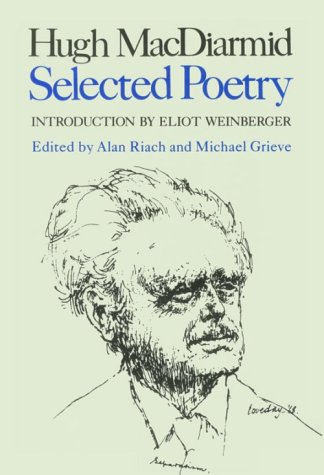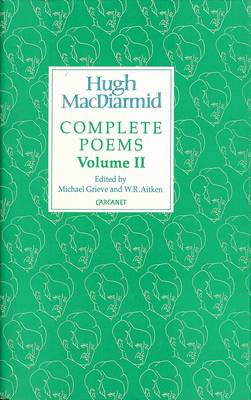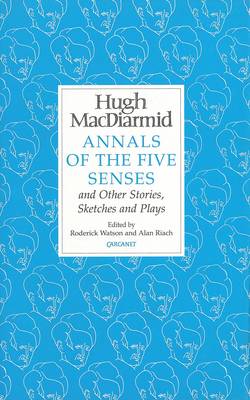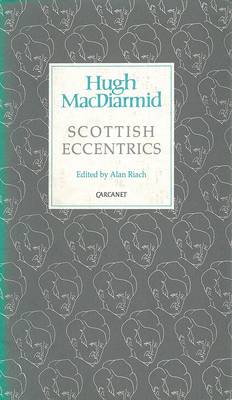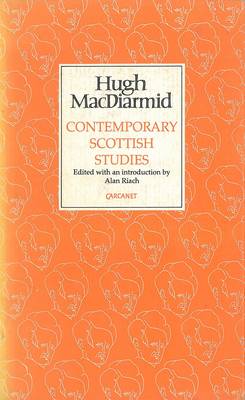MacDiarmid 2000 S.
6 total works
v. 5
Hugh MacDiarmid’s Selected Poetry is an invaluable introduction to the work of a major poet who, despite the enthusiasm of T.S. Eliot and Ezra Pound, remains little known in the United States. MacDiarmid (1892-1978), universally recognized as the greatest Scottish poet since Robert Burns and the man responsible for reviving Scots as a literary language, was also the author of an enormous body of poems in English. As the noted critic and translator Eliot Weinberger writes of MacDiarmid’s work in his introduction: “There is nothing like it in modern literature, nothing even close. It is an attempt to return poetry to its original role as repository for all that a culture knows about itself.” Edited by Alan Riach and the poet’s son Michael Grieve, the Selected Poetry draws generously from fifty years of work, and includes the complete text of MacDiarmid’s 1926 masterpiece, “A Drunk Man Looks at the Thistle.”
This volume concludes the corrected text of the almost 1500 pages of Hugh MacDiarmid's "Complete Poems", with a volume including the full texts of "In Memoriam James Joyce" (1955), "Three Hymns to Lenin" (1957), "The Kind of Poetry I Want" (1961) and much else: long poems and intense lyrics, ephemera and polemics, with appendices of early poems omitted from the first volume.
This volume contains the previously uncollected essays, journalism and interviews of Hugh MacDiarmid, as part of Carcanet's MacDiarmid 2000 programme. Other titles in the series include Complete Poems, Lucky Poet, Contemporary Scottish Studies and Scottish Eccentrics.
Annals of the Five Senses and Other Stories, Sketches and Plays
by Hugh MacDiarmid
Published 25 November 1999
This was the first book to be published (1923) by C.M. Grieve, the author who became known as Hugh MacDiarmid. This is a collection of psychological studies, written in the aftermath of World War I. Some of the studies in this book are based upon the author's own life, and others explore both male and female viewpoints. The text also includes a range of short stories, mainly from the 1920s and 1930s, with vignettes in vernacular Scots, short plays, and a ballet scenario. MacDiarmid's fiction ranges from the "grand guignol" and pastiche of his earliest published tales, including "The Black Monkey", to the comedy of "The Last Great Burns Discovery" and the ambiguities of family relationships in "Andy" and "The Jackknife". The book is the eleventh volume to be published as part of Carcanet's MacDiarmid 2000 programme.
v. 4
MacDiarmid's study of the eccentric, impulsive Scottish genius is of his most important prose works, and takes its place as Volume IV of the MacDiarmid 2000 edition launched in 1992 to celebrate the centenary of his birth. Written mostly in exile in the Shetland Isles, MacDiarmid's study of individual eccentrics became a study of individualism, eccentricity and national indentity. The book focuses on ten characters from the 17th, 18th and 19th centuries but shorter sketches of other individuals are also included. lt culminates in an epilogue on the "Strange Procession" of men and women whose characteristic qualities display the unpredictable energies and extremes of human behaviour associated with "The Caledonian Antisyzygy" - the close association of gargoyle and saint. First published in 1936, "Scottish Eccentrics" was reprinted in 1972 in a limited edition which quickly went out of print. This new edition includes the introductory note by Norman MacCaig from the 1972 edition and a new afterword by Alan Riach, setting the work in its context.
These essays, first published between 1925 and 1927, propose a radical overhaul and a new construction of Scotland's cultural identity. MacDiarmid focuses on poetry and the novel, on theatre, art, music, history and education, and also on writing by women in Scotland. His criticism of conventional attitudes is balanced by an appraisal of the possibilities in Scotland for a renaissance in the arts and a reassertion of national cultural and political identity. MacDiarmid seeks to integrate cultural and social wellbeing. How successful has his challenge been met? The essays are published with the correspondence to which they gave rise, and which form a running commentary. The author's 1976 comments appear in the book as an appendix.
